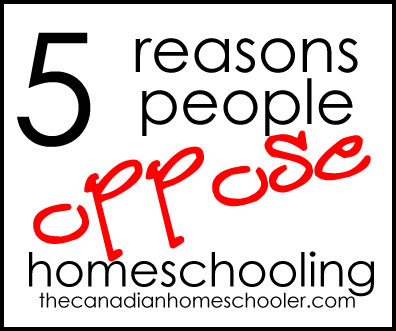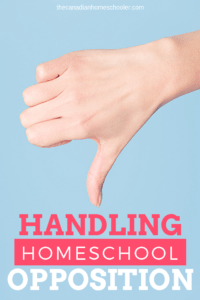Although homeschooling is quickly growing to a point where it’s being more accepted as a form of education in most communities, there are still a lot of people who stand opposed to it. Here are what I’d consider 5 reasons people oppose homeschooling.

1. They think since a teacher is trained they should be the only ones to teach our kids.
Don’t get me wrong.
Certified teachers work hard to earn their degrees in education and are very knowledgeable people who deserve outstanding credit for the time, effort, and passion they have for teaching children. They can hold a wealth of knowledge about child development and educational theory. They put in the hands-on hours and spend loads of out-of-pocket money.
But, they aren’t the only way for kids to be taught.
Even well-experienced teachers have to look for resources and materials when faced with a new subject or grade level. They have to figure out how best to teach the children in their care and cover the material that they need to. They aren’t experts in every subject or lesson. Just like us.
The advantages that homeschooling parents have are:
- we have much smaller “class size”
- we can outsource for any subjects that we aren’t great with
- we can learn along with the kids
- we can personalize lessons based on children’s learning styles and interests
2. They think we are failing our kids.
In Ontario, for example, where the government is essentially uninvolved in the education plans of homeschoolers, you tend to hear a lot of shock and disapproval from the opposition. People seem to expect kids to be monitored and supervised by government officials in order to succeed in their education.
The primary goal of a homeschooler is to instill a love of learning and the skills needed to learn whatever they want. Whether or not they get an education at home that completely checks off all the ideals of a mass planned education system doesn’t really mean that we have failed our kids. It means that their education has differed.
If “failing our kids” refers to their long-term success, then taking a look at the results of the research presented in the “Fifteen Years Later: Home-Educated Canadian Adults” to see that both homeschooled and publicly-educated adults are comparable in adult life.
To be fair (and as transparent as possible), many homeschooling parents worry about this exact issue. There’s this little voice that pops into our heads, as we ask ourselves if we are failing our kids’ education. As we struggle with this self-doubt, commitment to homeschooling and to our kids, keeps us on our path.
3. They think we are sheltering our children.
And I ask you … Is this a bad thing? Why do our kids need to be thrown into the world at an early age and expected to sink or swim? They are children. There’s nothing wrong with allowing them to be young and innocent.
I once read a great analogy that likened children to seedlings. We protect the seedlings in a greenhouse until they are ready to be planted in a harsher environment, so why not our children too. I invite you to learn more about Homeschooling and the S-Word (Socialization) – there’s a few about sheltering kids here too! – from some other bloggers’ points of views.
4. They don’t really understand homeschooling.
The fact remains that a lot of people just don’t “get” homeschooling. Many people continue to believe that homeschooling is simply a group of “crazy religious nuts.” Others have heard about or known a situation that put homeschooling in a bad light, leaving a negative taste in their mouth.
In 2012, I co-wrote an article about homeschooling for the Huffington Post about the common myths about homeschooling. In honesty, the backlash of negative comments actually shocked me enough to need to take some time to respond. It amazed me that people still felt that way about homeschooling. If that is what the general public is given to think homeschooling is, then no wonder there’s opposition.
5. It’s against the norm. That’s scary.
Anytime anyone bucks the system they are going to get some flack. Homeschooling goes against the system and that makes people nervous and scared. Whenever people see something out of the ordinary, there seems to be an instant need to oppose it.
Want to learn some ways to deal with homeschool opposition? Read Handling Homeschool Opposition to find out more!
What do you think? Are these the reasons that people tend to voice their opposition to homeschooling?
- How to Keep a Toddler Busy While Homeschooling - March 21, 2024
- 25+ Things Your Kids Learn From Video Games - March 20, 2024
- 10 Words For New Homeschoolers - March 20, 2024


Another aspect of the ‘sheltering’ issue is actually just the opposite observation. Homeschooled kids are actually out and about and part of the ‘real world’, whereas public schooled kids are ‘sheltered’ in an artificial, regimented environment for 13 years until they’re suddenly considered ‘adults’ and thrown out into the world with little to no actual experience in it. They get out into the work world or the post-secondary environment and all too often, still expect to be told what to do and how to fill their time and what to know. And they may have little to no real-world skills, like how to make a meal for a family, how to paint their apartment, how to deal with a landlord, how to fix a clogged toilet, how to take out a loan from a bank, how to plant and look after a garden.
So I agree that it’s usually better to ‘shelter’ younger children until they’re ready to venture forth and explore the world in their own time and their own readiness. But once they are — it’s actually the public schooled kids who remain sheltered.
Good observations.
Great observations, Lisa! You are a great “question-asker.” Unfortunately I haven’t gotten the “socialization” question in a long time….early on when we’d first begun it was a harder question to answer. I loved your thoughts on that. Another thing I’ve noticed with our boy is his ability to be comfortable socially with many different age groups…not just the peers who are his own age.
As usual, awesome!